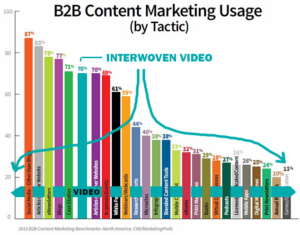
You’ve probably seen the original of the chart at the right (adapted from a Marketing Profs survey), or one like it, rank ordering content marketers’ reliance on various “tactics.” As a tactic, video seems to be essential. But, companies often fail to think about integrating video with other tactics. They just order up “a video about X,” as if the video, by itself, were the solution.
Sure, video is great. And there is plenty of evidence that “video” is good for content marketing. If, for example, you Google “video increases website SEO”, you can get more than 58,000,000 results. I’m sure almost all support the proposition.
What’s more, the same video can be used in numerous channels.
But that doesn’t mean your videos should repeat the same message people are seeing in your other marketing channels.
The problem with “repetitiveness”
Yes, you want “consistent messaging” across all channels. But, you don’t want to keep repeating the same message. That won’t help you lead prospects down the sales funnel — it may even annoy them.
What will lead them down the sales funnel is to to coordinate tactics so each message in each medium strengthens the whole.
For example, suppose you produce a video designed to connect key decision makers to a challenge they are facing. Your video can do a great job of depicting how your solution meets the challenge — but it’s not likely to have the heft to convince anyone. These are complex technologies with long sales cycles we’re dealing with here, not social apps of stunningly obvious coolness.
Promoting a webinar
So, wouldn’t it make sense to use the video to promote a webinar that explains your new process or strategy in detail? Along with a case study? Now you can follow up the webinar with a 2-Minute Explainer video that connects the dots and summarizes how your technology supports the process that you described in the webinar. From there, you help prospects you can help prospects understand more about how your software or technology works with additional case studies and white papers. I’ll go into more detail on how to use videos with webinars next week.
More to come
See how the different channels be interlaced to form a holistic strategy that bring in more leads and clients? In the coming weeks, I’ll share some content marketing tactics using vsideo in support of product launches, webinars, and other sales and marketing initiatives — and how to weave content marketing tactics into content marketing strategies that get results.



